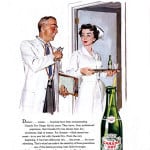 This week, May 6-13, is National Nurses Week. It's always important, but it's especially good to thank and recognize all of the talented, caring, hard working nurses out there.
This week, May 6-13, is National Nurses Week. It's always important, but it's especially good to thank and recognize all of the talented, caring, hard working nurses out there.
Nursing is important, difficult work. Sadly, the work is made more difficult than it should be due to bad processes and waste in the healthcare system. I've always sympathized with nurses who are forced to jump through these hoops every day (often not getting a proper lunch break, as they should). I very much enjoy working with nurses who participate in Lean and Kaizen activities to help fix the systems they work in.
This article caught my eye yesterday: “Medical errors leave devastating impact on families, professionals.”
The first victims of medical errors, being harmed or killed, are, of course, the patients and their families.
Health care workers say they are traumatized by preventable errors in what's known as the “second victim” phenomenon. Doctors or nurses who struggle after a medical error, death of a child or other unexpected event can lose confidence, have flashbacks and feel like abandoning their careers.
When so many problems are preventable, if we had better communication, processes, and systems, it's understandable why nurses (or others in healthcare) might be devastated when they are involved in a medical error.
Nobody comes to work with the intention to do a bad job.
We owe it to the patients to provide the best quality care. That's why we also owe it to nurses to not put them in a bad position where they might be involved in a systemic error. That's why we need error proofing instead of just asking people to be careful. We need to reduce waste to free up time so that nurses aren't fatigued or distracted, conditions that make errors more likely to occur.
When people ask me what motivates me about Lean healthcare – helping the nurses comes a close second after helping the patients.
Please scroll down (or click) to post a comment. Connect with me on LinkedIn.
If you’re working to build a culture where people feel safe to speak up, solve problems, and improve every day, I’d be glad to help. Let’s talk about how to strengthen Psychological Safety and Continuous Improvement in your organization.









Comments from LinkedIn:
Jacqueline C. Stocking: Proud to be part of a team that recognizes the “second victim” and actively works to error-proof systems while also providing support for and learning from health care providers who make an error.
Cynthia Bush” We cannot work without our precious nurses! Cynthia M.D. ♡♡♡
Happy Nurses Week! I work daily with some of the greatest most caring individuals there are. I truly appreciate what they do and the sacrifices they make.
I do want to share an experience I have seen that is potentially an unintended result to the “second victim” phenomenon. In conducting a recent RCA the second victim was brought up during the talk through. As it was presented around a patient fall situation, the person conducting the talk began sympathizing with the primary nurse that was caring for the patient. However, it really fostered more of a sense of guilt than understanding. The true issue was a poor decision making process by a supervisor that led to the incident. The primary nurse said at the end of the talk that she never felt like a victim until she was given that label. Summarily, please be careful not to create blame in these processes just to have something to hang a label on.
Have a blessed day!
Thanks for your comment, Stacy. I agree that the point shouldn’t be to create guilt or blame but to be understanding and empathetic when people need help or are traumatized.
If you dropped a patient, you damn well ought to feel guilty and labelling yourself as the victim is sick and twisted.
How about some sympathy for the patient?
Helen – with all respect… a patient fall has nothing to do with being “dropped.” Why do falls happen? Most often, it’s because a patient tries to get up on their own to go to the bathroom? Why do they try to go on their own? Because the nurses and techs are too busy to be able to respond to call lights fast enough… that’s a systemic problem.
I’m the first to be sympathetic toward patients. There’s FAR too much injury and death occurring in healthcare. But labeling people or blaming them isn’t going to prevent the next problem from occurring. This is far more complex than bad individuals.
Nurses are named as defendants in nine percent of CRICO malpractice cases, but we know they are involved in the care of virtually any patient who suffers an adverse outcome. We encourage employers to recognize that anyone emotionally impacted by such events needs an opportunity to address those feelings, for the clinician’s own benefit and so that her or his focus on subsequent patients is not compromised. Numerous organizations have developed or adopted “second victim” programs, some of which are presented through CRICO’s video, Healing the Healer. Our hope is that these efforts help dedicated and caring nurses (and doctors) cope with events that can instill serious doubt about continuing in health care.
Healing the Healer
http://www.rmf.harvard.edu/Clinician-Resources/Video/2010/Healing-the-Healer
Thanks for sharing that!
Do you have any clue as to how completely offensive this is to the ONLY victims of Medical harm. Are we next to get sad stories about how rapists feel after having victimized someone? Perps don’t get to claim the “term” victim. Health care workers who cause harm should have negative feelings– it’s called guilt and it is likely earned.
Let’s have more concerned about the real victims.
Helen – your comment is offensive and misguided on many levels.
For one, rape is an intentional criminal act.
Healthcare errors are due to complex systemic problems. The guilt usually isn’t earned, that’s why the term “second victim” is used by some. Nobody is forgetting or excusing the harm to the first victim – the patient.
When a nurse gives a patient the wrong medication, it’s NOT an intentional act. Comparing something like that to rape, or any other intentional crime, is beyond the pale. That attitude won’t fix what’s wrong with healthcare.
People in my family have suffered from medical errors. If that has happened to you or somebody in your family, I am very sorry to hear that. Your anger is understandable, but is better channeled into something productive — see the inspiring story of a mother, Sorrel King, who lost her daughter to a preventable medical error. She is channeling her initial rage and anger into activities that are helping prevent harm to other patients.
Listen here:
https://www.leanblog.org/2009/11/leanblog-podcast-78-sorrel-king/
Comments are closed.